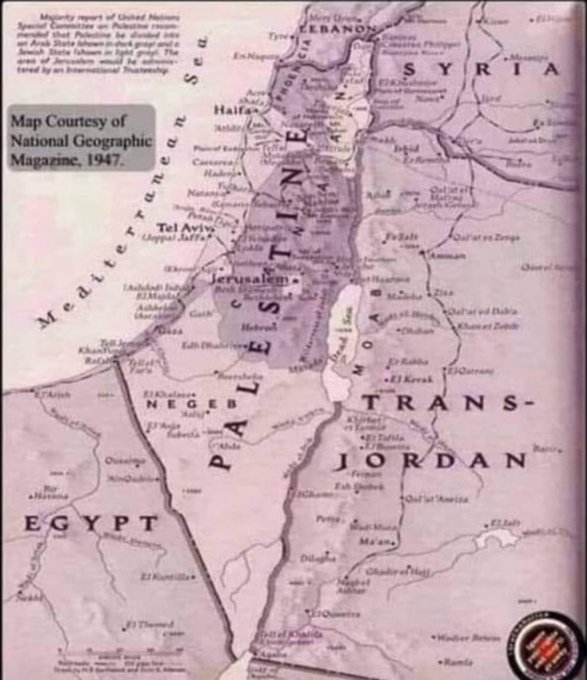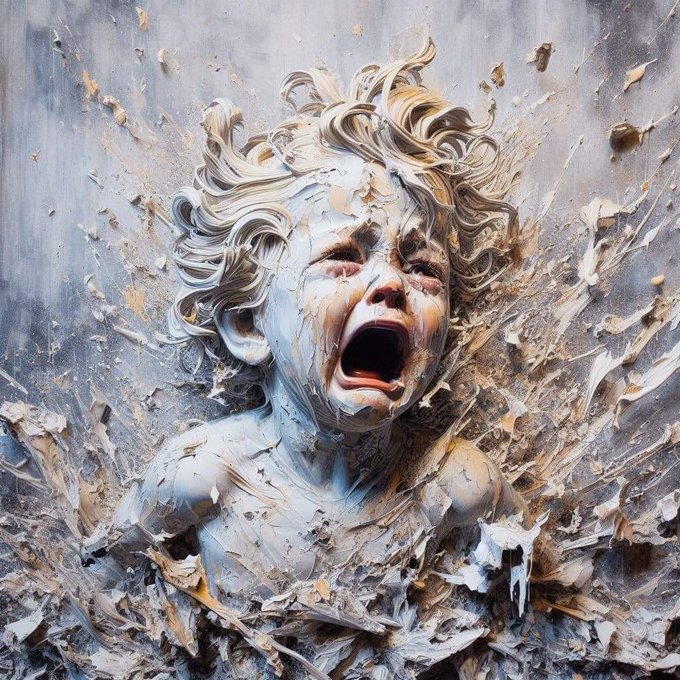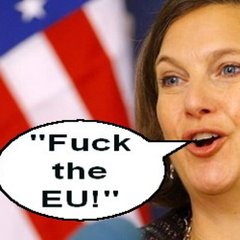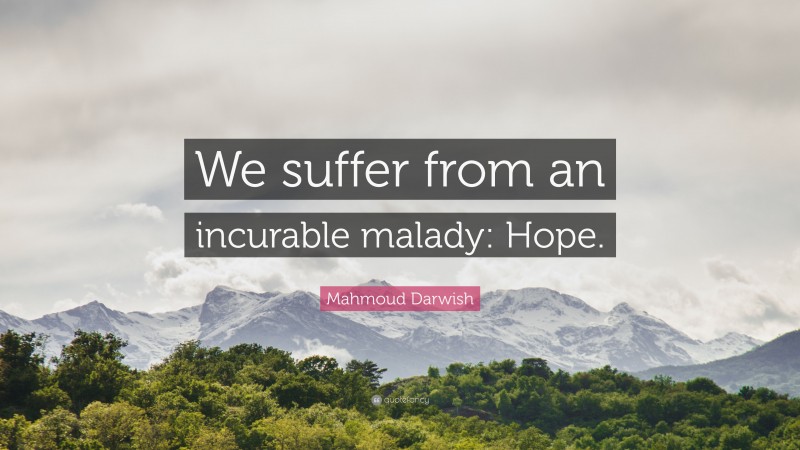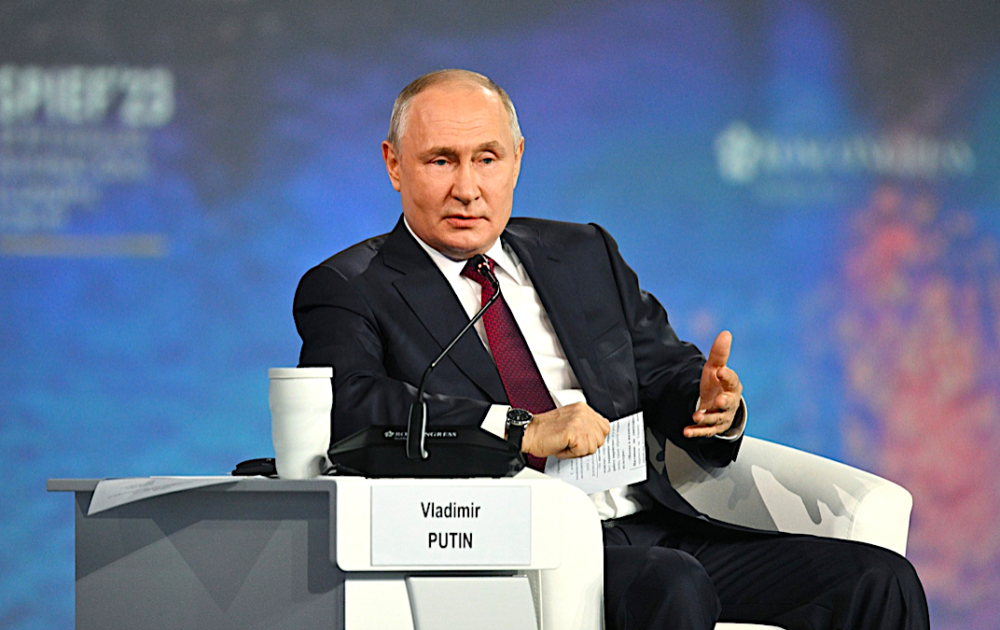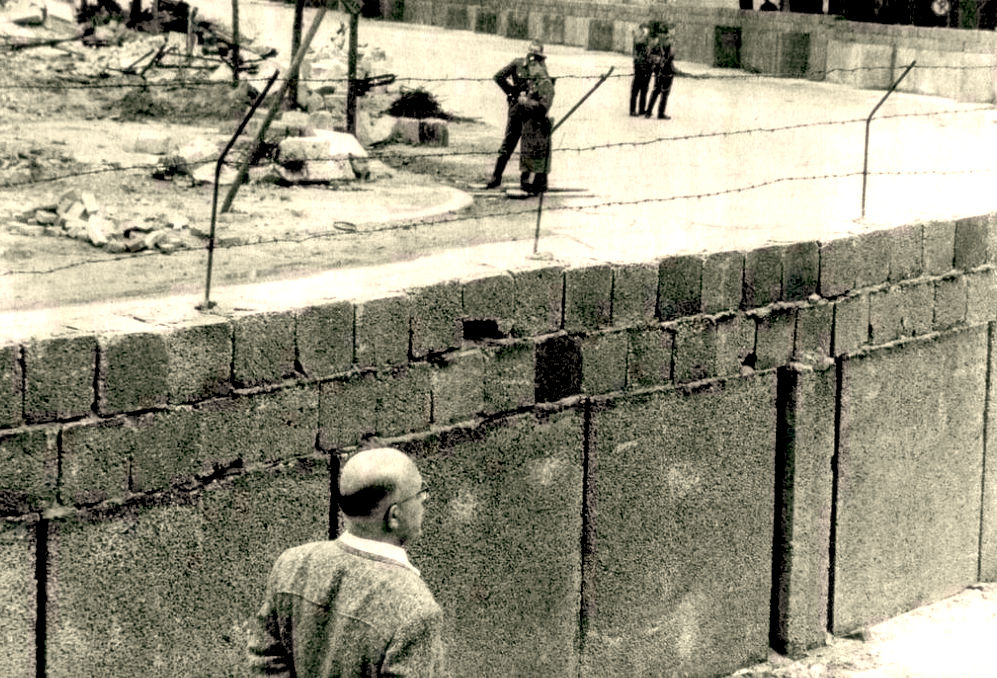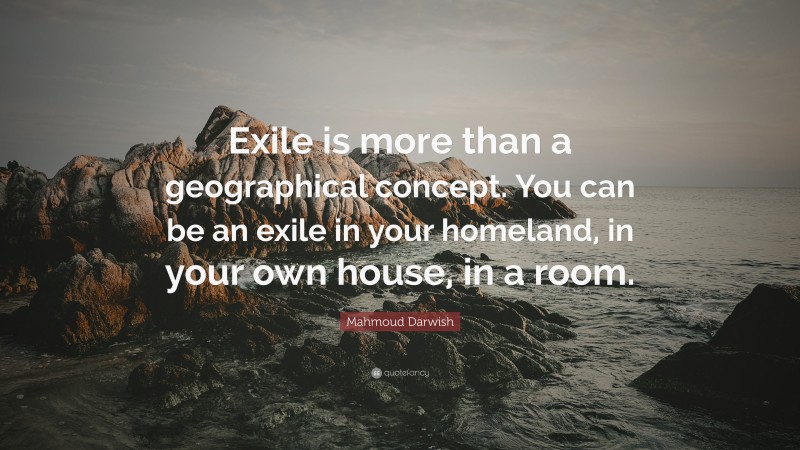GAZA (Gernika berria, Palestina) versus Israel (gehi AEB + NATO, Pentagonoa eta EB) (37)
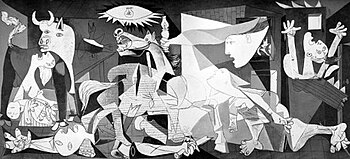
Gogoratzekoa
oooooo
oooooo
Europe? No, Thanks!
oooooo
World Children’s Day
oooooo
Mahmoud Darwich
“We suffer from an incurable malady: Hope.”
Sendaezinezko gaixotasuna daukagu: esperantza
oooooo
oooooo
Segida:
Seyed Mohammad Marandi@s_m_marandi
Wow. Thank you, Norway!
Bideoa: https://twitter.com/i/status/1736391859864220154
oooooo
Palestine Highlights@PalHighlight
Pro-Palestine protesters stage a massive demonstration in the Norwegian capital Oslo to condemn Israeli war crimes in Gaza.
Bideoa: https://twitter.com/i/status/1736319392659440054
oooooo
The pro #Israel Zara front window gets a makeover in Brussels – Say No to #Zara till Zara says No to Genocide…
2015. These “leaders” – Yahu included – march in solidarity with the slain Charlie Hebdo journalists.
2023. Israel kills over 90 journalists in Gaza.
ZERO solidarity from the “our values” West.
International parties are holding talks with Houthis to Reduce the rising tensions in the Red Sea. Houthis state that Yemen’s position on Gaza is non-negotiable, and they declare that ships belonging to Israel will continue to be targeted until the war ends.
oooooo
Remember to BOYCOTT Child Killers today
Thank you Paris. Don’t stop talking about Gaza.
Dunia was killed yesterday in Nasser hospital south of #Gaza.
Israel killed her dream too, together with 8000 children in Gaza.
Bideoa: https://twitter.com/i/status/1737249192010035274
oooooo
Ahead of today’s ceasefire vote in the UN Security Council, I told @BBCr4today that the world has failed the Palestinian people. Today is an opportunity to start restoring international law and order.
Bideoa: https://twitter.com/i/status/1737095572744552774
oooooo
Back in January 2023, I gave a presentation at the Bethlehem Public Library, in Delmar, New York.
“We’re being told that this is a noble cause and that the Ukrainians actually have a chance to win,” I said. “Any military analyst worth his or her salt will tell you that given the current set of circumstances, Ukraine has no chance of winning. We’re setting them up for a decisive defeat. This war will continue. Russia is not going to roll over and play dead,” I noted. “I believe Russia is going to win this war and to do that, they’re going to have to kill hundreds of thousands of Ukrainians.”
Anton Konev (@konev4council) took umbrage at my remarks.
What say you now, Anton.
Was your blind hatred of Putin’s Russia worth the price?
You owe every Ukrainian an apology. Because of you and Americans like you, the Ukrainians believed America would be with them until the end.
America abandoned Ukraine.
And you betrayed Ukraine.
You will carry the blood of the dead Ukrainian soldiers on your soul for the rest of your life.
oooooo
Parody account:
Aipamena
Secretary Antony Blinken @SecBlinken
@SecBlinken
abe. 10
Human rights belong to everyone. They are universal, indivisible, and interrelated. Today, as we recognize 75 years of the Universal Declaration of Human Rights, the U.S. reaffirms our deep commitment to protect human rights and hold human rights abusers accountable.
oooooo
Anyone but Biden and Harris in 2024. Anyone.
Aipamena
Mats Nilsson@mazzenilsson
abe. 12
Suddenly the Rumsfeld: You see well there are known knowns and known unknowns makes perfect sense.
#BidenHarris2024! twitter.com/GDebatta/statu…
oooooo
youtube.com
Brutally Unrealistic | Scott Ritter
Scott Ritter is a former Marine intelligence officer who served in the former Soviet Union, implemen
Bideoa: https://youtu.be/Hpecq04wBwM
Hello, do you have any idea who is singing this incredible song which I found, in 2 parts? on a Telegram channel last night? It deserves to be No. 1 song, EVERYWHERE . “Run, run little boy… til you’re taught to fight back!” #palestineresists #GazaGenocide
Bideoa: https://twitter.com/i/status/1734601857618555293
oooooo
youtube.com
Scott Ritter: Israeli Slaughter Serves No Meaningful Military Purpose.
This conversation serves as an opportunity to decipher the intricacies of military decision-making,
Bideoa: https://youtu.be/LQiUuX3ZM5c
oooooo
NewRulesGeopolitics@NewRulesGeo
Will Ukraine Collapse in 2024? #NewRulesPodcast spoke with @RealScottRitter about Ukraine’s looming military crisis and why there’s nothing Biden can do about it.
Bideoa: https://twitter.com/i/status/1734883101451362526
oooooo
youtube.com
SCOTT RITTER LIVE | The Next Conflict With America | Gaza | Israel
#scottritter #israel #chinaSCOTT RITTER LIVE :Nations Secretary-General Antonio Guterres has
Bideoa: https://youtu.be/S3HcIrz1GpY
oooooo
youtube.com
SCOTT RITTER ON ZELENSKY IN SHAMBLES AS NATO DEFEAT LOOMS PLUS MORE!
Stream starts at 1:41Friend of the show and former UN Weapons Inspector Scott Ritter (Telegram https://
Bideoa: https://youtu.be/8edErCbC9F
CRAZY: Israeli soldier is hitting a bong in the window … Qassam shoots RPG at him. Don’t do drugs kids …
Bideoa: https://twitter.com/i/status/1735022677012746452
oooooo
youtube.com
SCOTT RITTER ON ZELENSKY IN SHAMBLES AS NATO DEFEAT LOOMS PLUS MORE!
Stream starts at 1:41Friend of the show and former UN Weapons Inspector Scott Ritter (Telegram
Bideoa: https://youtu.be/8edErCbC9FI
oooooo
Scott Ritter: Ukraine Debased to ‘Pawn’ on Geopolitical Chessboard Serving West
oooooo
“Ukraine will surrender and Zelensky is FINISHED” Fmr. U.S. Marine…
Former U.S. weapons inspector Scott Ritter joins Redacted to talk about Zelensky’s statements abo
Bideoa: https://youtu.be/SbSF9rW4qII
oooooo
This is my take as well.
Aipamena
Arnaud Bertrand@RnaudBertrand
abe. 15
@RnaudBertrand erabiltzaileari erantzuten
By the way, this is the source video (which is worth watching in full): https://youtube.com/watch?v=hchzdc
oooooo
Aipamena
Quartz_medical@MedicalQua21453
abe. 15
@mishtal eta @BBCNews erabiltzaileei erantzuten
Today, Israeli soldiers brutally beating and assaulting the photographer mostafa kharouf in west bank 15.12.2023
Bideoa: https://twitter.com/i/status/1735647223671591183
oooooo
Lying? Have you read the official Israeli report? In civilian clothes, hands in the air, flying a white flag?
The final victim screaming in Hebrew, “Save us!”, before being gunned down?
US Marines would go to prison for this.
Tell me where the lie is.
Or shut the fuck up.
oooooo
An honor to shake hands with the great @RealScottRitterat the recent @RealCPIUSA convention

oooooo
After watching Israeli troops drive a bulldozer into a hospital, crushing innocent civilians, patients, and medical personnel, I’ve come to the conclusion that maybe the world would be better off without Israel.
Jews are welcome to live in peace as citizens of Palestine.
But this aberration we call Israel has got to go.
oooooo
Scott Ritter: Joe Biden’s World War Three Fantasy
(https://sputnikglobe.com/20231216/scott-ritter-joe-bidens-world-war-iii-fantasy-1115624459.html)
oooooo
Anyone who thinks that a U.S./Israeli victory over Hamas is inevitable needs to listen to this young lady and reconsider their analysis.
Aipamena
@themooonloverrr
abe. 17
@Megatron_ron erabiltzaileari erantzuten
Palestinians are the most resilient people on earth.
Absolute chills.
Bideoa: https://twitter.com/i/status/1736502585287471122
oooooo
In the interest of the Holiday spirit, I will endeavor to be more civil when responding to posts that touch upon issues that relate to my experience, or to me personally.
But I’m only human.
It would be a lot easier if Israel accepted a ceasefire, and the U.S./NATO stopped trying to destroy Russia via proxy.
The personal attacks on me?
Like water off a ducks back.
Happy Holidays in a world gone mad.
oooooo
I woke up this morning to the news that my country, the United States of America, is preparing to go to war against Yemen.
A superpower that spends nearly a trillion dollars a year on its military is preparing to fight an impoverished nation where 70 percent of its population is in dire need of humanitarian assistance.
The reason? Because the Houthi of Yemen demand Israel stop committing genocide against the people of Gaza.
Our choice was between pressuring Israel to agree to a ceasefire, or a war with the Houthi.
We chose war.
It speaks volumes about who Americans are as a collective.
PS: I don’t think this will end well for either the U.S. or Israel.
oooooo
SCOTT RITTER: On Speaking Plain ‘Putin’
(https://consortiumnews.com/2023/12/18/scott-ritter-on-speaking-plain-putin/)
December 18, 2023
Any retrospective on the Russian-Ukraine conflict begins with a modicum of interest in how Moscow defines the conflict. First of an article in two parts.
Russian President Vladimir Putin in June, during the St Petersburg International Economic Forum. (Ramil Sitdikov, RIA Novosti Host Photo Agency, Kremlin)
By Scott Ritter
Special to Consortium News
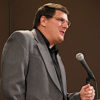 Back in March, I had the opportunity to participate in an on-line forum where a well-known Russian expert provided a briefing on the “ground truth” as he saw it from Moscow.
Back in March, I had the opportunity to participate in an on-line forum where a well-known Russian expert provided a briefing on the “ground truth” as he saw it from Moscow.
Following the briefing, the floor was opened for questions. I had noted that the briefer, the moderator, and indeed the audience made repetitive use of the term “invasion” to describe what Russia has called a “Special Military Operation.”
I brought up the limited objectives of the Russian military effort at the time of its initiation, namely the goal of compelling Ukraine to agree to a negotiated settlement and asked if the term “Special Military Operation” was not a more accurate description of reality.
The expert understood my question and agreed that the term “Special Military Operation” carried with it a specific connotation which distinguished it from a classic military invasion. However, in the group chat, where participants were able to comment on the proceedings, one individual offered the following observation: “‘Special Military Operation?’ What’s that? I don’t speak Putin.”
[Related: SCOTT RITTER: On Horseradish & Nuclear War]
This forum was intended as a way to better inform the participants about one of the most pressing issues of the day — the conflict between Russia and Ukraine — and to better prepare them for assessing the consequences of this conflict globally.
Given the failure of the collective West to impose its will on Russia through what is widely considered a proxy conflict, one would think that some form of retrospective analysis would be in order. However, to engage in such an activity constructively, an agreed-upon lexicon would be needed to communicate effectively.
Since Russia is prevailing in the conflict, one would also think that a modicum of interest should be given to how Russia defines the conflict. In short, anyone who is interested in learning the lessons of the collective West’s failure in Ukraine should learn “to speak Putin.”
Worn-Out Cold War Thinking
The problem is, those in the West who should be preparing a proper lexicon from which the Russian-Ukraine conflict could be more accurately assessed are instead operating from an outdated lexicon rooted in the language and mindset of a time that no longer exists, born of a Cold War mentality that prevents any deep-seated and relevant analysis of the true situation between Russia and the West.
Both the United States and NATO have described the Russia-Ukraine conflict as possessing existential consequences for Europe and the world, with the secretary general of NATO, Jens Stoltenberg, going so far as to declare in October 2022 that “Russia’s victory in the war against Ukraine will be a defeat of NATO,” adding ominously, “This cannot be allowed.”
Bad news, Mr. Stoltenberg — Russia has won. While the “Special Military Operation” has yet to be concluded, Russia has seized the strategic initiative across the board when it comes to conflict with Ukraine, forcing the Ukrainian military to terminate a counteroffensive, which the government of Ukraine and its NATO allies had invested tens of billions of dollars in military resources, and tens of thousands of Ukrainian lives in hopes of achieving a decisive victory over the Russian military on the battlefield.
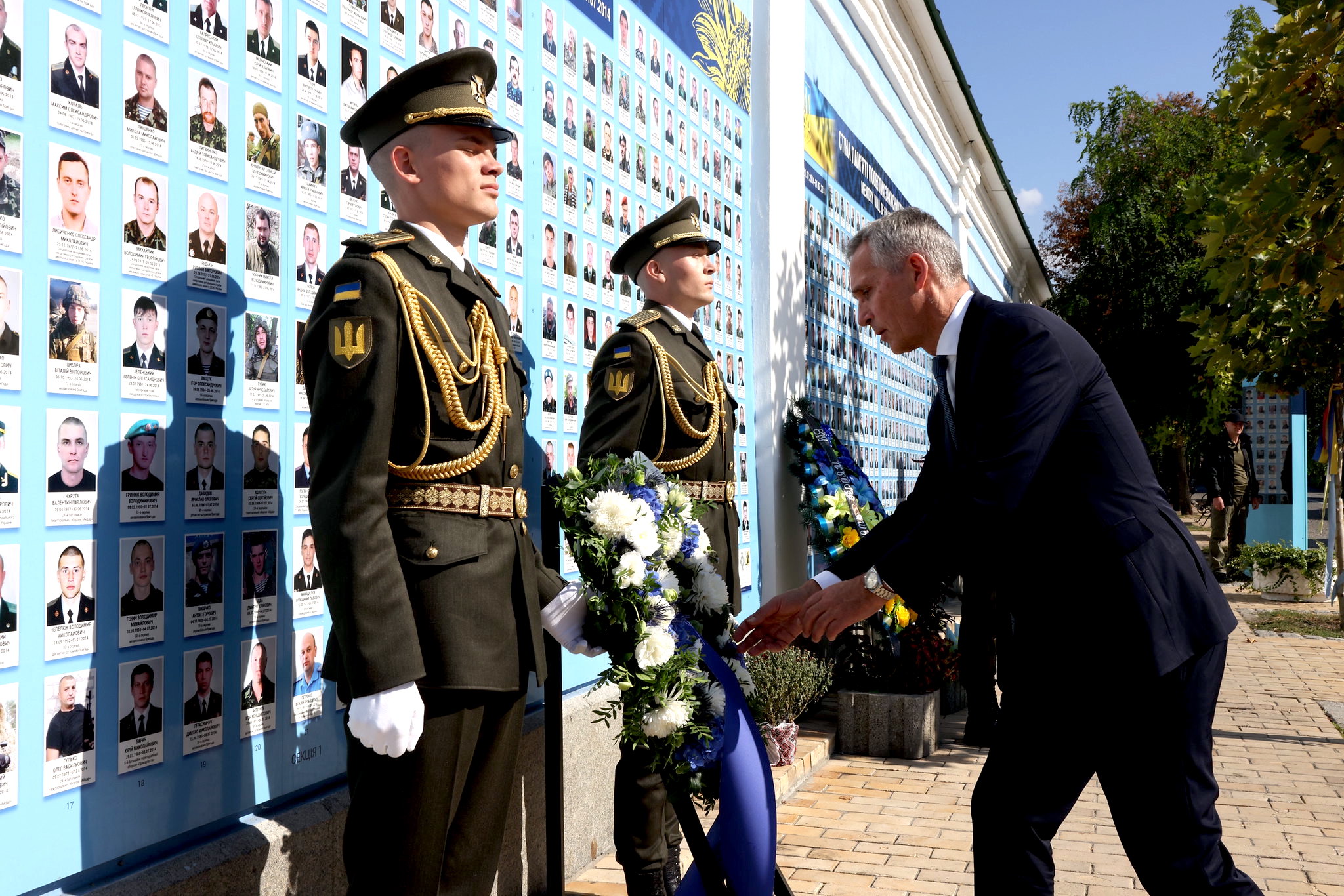
Stoltenberg laying a wreath at the Wall of Remembrance of the Fallen for Ukraine on Sept. 28. (NATO, Flickr, CC BY-NC-ND 2.0)
Today, Ukraine finds its military decimated by the fighting and unable to sustain itself as a cohesive combat force on the field of battle. The U.S. and NATO likewise find themselves unable and/or unwilling to continue supplying Ukraine with the money and material needed to continue to maintain a viable military presence on the battlefield.
Russia is in the process of transitioning away from a posture of flexible defense, and instead initiating offensive operations along the length of the line of contact designed to exploit opportunities presented by an increasingly depleted, and defeated, Ukrainian army.
U.S. President Joe Biden has likewise argued that a Russian victory was unacceptable.
“We can’t let Putin win,” Biden said earlier this month to put pressure on a U.S. Congress that has allowed the Ukrainian conflict to become wrapped up in domestic American politics, with key Republicans in both the Senate and House refusing to support a funding bill that lumps some $60 billion in Ukraine assistance together with money for Israel and immigration reform.
“Any disruption in our ability to supply Ukraine clearly strengthens Putin’s position,” Biden concluded.
Biden’s articulation of the quandary faced by his administration underscores the extent to which the U.S. and its European allies have personalized the Russian-Ukraine conflict. In their eyes, this is Russian President Vladimir Putin’s war.
Indeed, Russia itself has been reduced to being a mere appendage of the Russian president. In this, Biden is not alone. An entire class of erstwhile Russian “experts” — including the likes of former U.S. Ambassador to Russia Michael McFaul; the Pulitzer Prize-winning historian Anne Applebaum; and a host of so-called national security experts, including former Deputy National Intelligence Officer for Russia Andrea Kendall-Taylor and the former Russia Director for the National Security Council Fiona Hill — have all made the ongoing conflict between Ukraine and Russia all about Putin.
In a recent interview with Politico, Hill, the co-author of Mr. Putin: Operative in the Kremlin, published in 2015, mirrored the statements by Stoltenberg and Biden that defined the Russia-Ukraine conflict as an existential crisis.
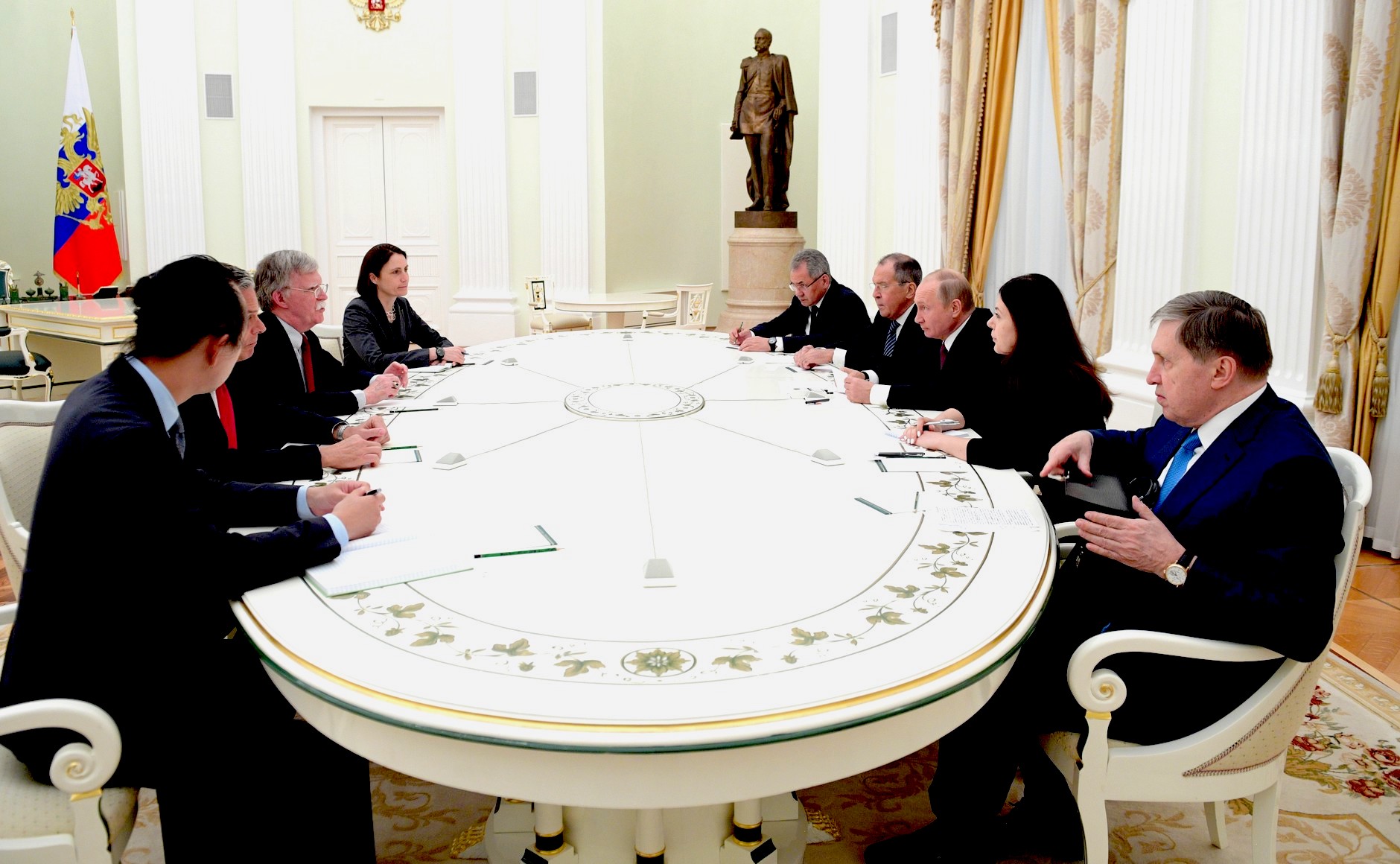
March 2018: Fiona Hill, at far end of left side of table, at a meeting between U.S. National Security Advisor John Bolton — beside Hill — and Putin in Moscow. (Kremlin.ru, CC BY 4.0, Wikimedia Commons)
Kendall-Taylor, who in 2022 co-authored an article in Foreign Affairs titled “The Beginning of the End for Putin?” likewise views the conflict as an extension of Putin’s needs as an individual, more than Russia’s needs as a nation.
“Putin,” Kendall-Taylor told NPR in January 2022, before the start of the Special Military Operation,
“really is looking to keep Ukraine in Russia’s orbit. After 20 years of him being in power, he’s thinking about his legacy, and he wants to be the leader who returned Russia to greatness. And to do that, he has to restore Russian influence in Ukraine.
And for him, I think it’s really personal. Putin, over his 20 years — 22 years now in power, has tried and failed repeatedly to bring Ukraine back into the fold. And I think he senses that now is this — his time to take care of this unfinished business.”
Such an outcome, of course, is unacceptable, according to Kendall-Taylor. “I don’t think it’s overstating it to highlight how important the U.S. assistance is,” she recently told The New York Times. “If the assistance doesn’t continue, then this war takes on a radically different nature moving forward.”
Applebaum in November penned an article in The Atlantic titled “The Russian Empire Must Die,” wherein she argued that “a better future requires Putin’s defeat — and the end to imperial aspirations.” She recently gave her opinion of Putin’s legacy in the aftermath of the Ukraine conflict.
“I don’t think there’s any question that Putin will be remembered as the man who really set out to destroy his own country,” Applebaum told Radio Free Europe/Radio Liberty in an interview last August. Putin, Applebaum declared,
“is somebody who has worsened the living standards, and freedom, and culture of Russia itself. He doesn’t seem to care about the well-being or prosperity of ordinary Russians. They’re just cannon fodder to him. He’s not interested in, you know, Russian achievements in infrastructure or art or in literature and in anything else. He has impoverished Russians. And he’s also brought back a form of dictatorship that I think most Russians had thought they’d left behind.”
What the Russian president is doing, Applebaum said, “is really destroying modern Russia. And I think that’s what he’ll be remembered for overall.”
‘Russia Is the Problem Because it Empowers Putin’
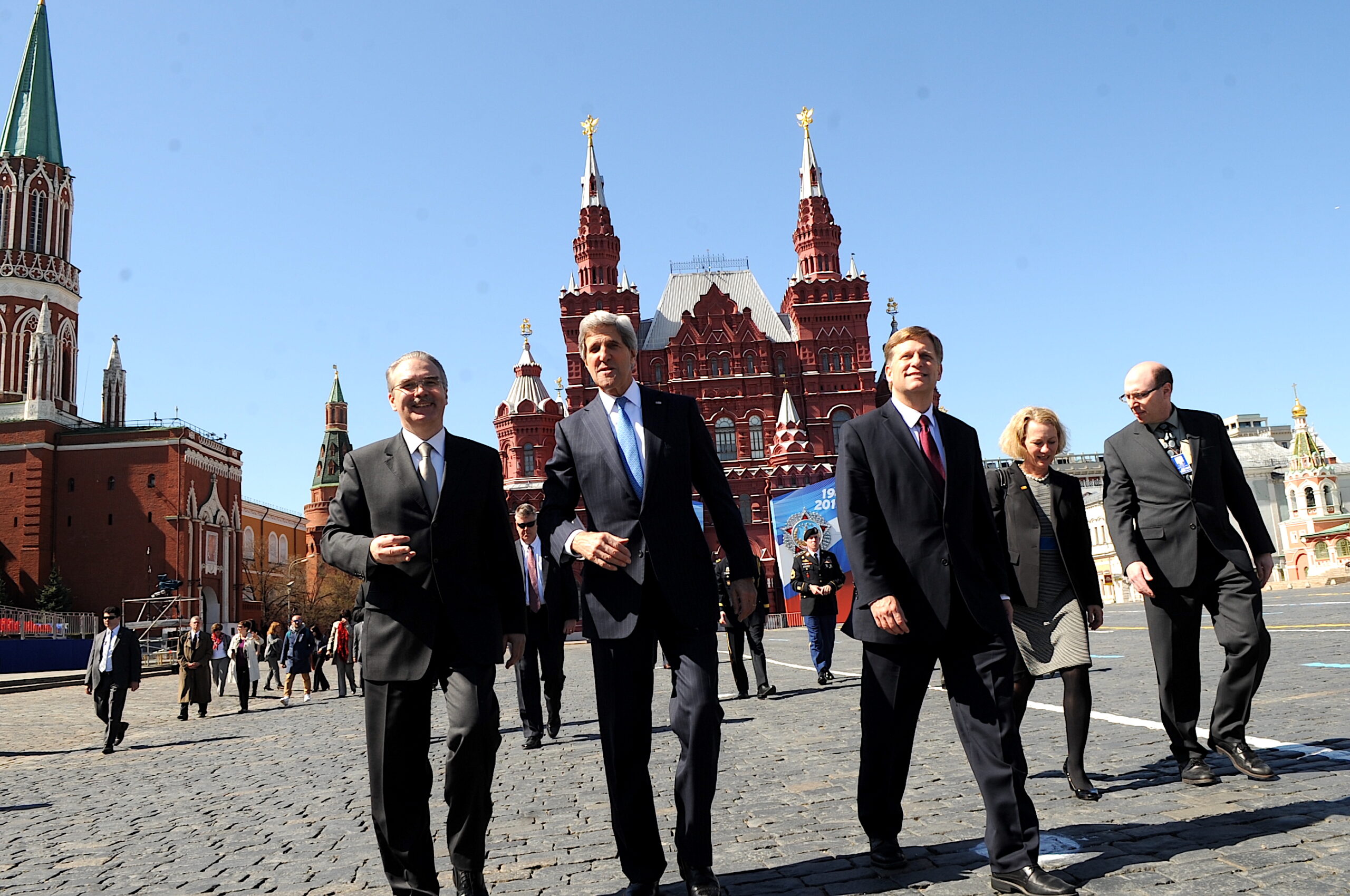
Touring Red Square in Moscow in May 2013: McFaul, when he was U.S. ambassador to Russia, is third from right. From left: Russian Chief of Protocol Yuriy Filatov and U.S. Secretary of State John Kerry (State Department, Public domain)
McFaul, the former U.S. ambassador to Russia, wrote a memoir, From Cold War to Hot Peace: An American Ambassador to Putin’s Russia. In a recent interview with Radio Free Europe/Radio Liberty, McFaul stated that, “I changed my views as a result of this horrific, barbaric war in Ukraine, because Putin made the decision to invade Ukraine.” Russia, McFaul now claims, is the problem because Russia has empowered Putin.
McFaul backs up his assessment with a bit of revisionist history.
Calling Putin “a completely accidental leader of Russia,” McFaul labeled Putin “a creature of the existing regime” appointed by Boris Yeltsin, the first president of Russia, and lacking in any meaningful political constituency.
Putin, McFaul claims, “wants to create this myth that ‘there was the chaos of the ‘90s, and I came in as the hero.’ That’s complete and utter nonsense,” McFaul asserts. “That’s not the history the way it was in real time.”
Given Putin’s lack of political pedigree, McFaul says, “we don’t necessarily know if Russians support him. How do you know when there’s not real free and fair elections, when there’s no real media? You can’t know if he’s popular or not in those conditions.”
McFaul says that “I changed my views” about the culpability of the Russian people for Putin
“as a result of this horrific, barbaric war in Ukraine, because Putin made the decision to invade Ukraine. There was no vote; there’s no referendum. We don’t know what Russians actually thought about that decision. There is public-opinion polling before it to suggest that they didn’t want that fight, including by independent organizations, even Western organizations.
But once he went in, there was support — as there usually is when countries go to war — and now there are Russians that are raping Ukrainian women and children; there are Russians that are committing massive atrocities inside Ukraine. So Putin can’t do those things without the support of Russians. And therefore, this excuse that Russians are not guilty and they shouldn’t be treated badly, and they shouldn’t be sanctioned because of autocracy, I disagree with that.”
Putin’s war, McFaul concludes, is now Russia’s war.
McFaul’s unsubstantiated allegations of Russian atrocities provide a clear picture of the fact-free foundation used by the former ambassador to shape his narrative of Putin’s Russia.
McFaul’s assertion of rape is particularly egregious, considering that, at the time of his interview — July 2023 — these allegations had been quashed by Ukraine itself following the revelations that Lyudmila Denisova, the Ukrainian Parliament’s commissioner for human rights, had issued official statements using unverified information.
In a letter to the Parliament, Ukrainian journalists said Denisova’s reports were harmful to Ukraine, noting that the information put out by Denisova’s office was regarded as factual by the media, and was “then used in articles and in speeches by public figures.”
Denisova was fired in May 2022 — more than a year before McFaul echoed her discredited allegations in a living manifestation of the caution set forth by the Ukrainian journalists.
[See: Caitlin Johnstone: Official Behind Media Reports of Russian Atrocities Fired by Ukrainian Parliament]
McFaul premised much of his altered view regarding the co-responsibility of the Russian people for the conflict with Ukraine on his understanding of the events of the 1990’s, and how these events shaped the rise to political prominence of Vladimir Putin.
Curiously, McFaul asserts that any notion of the decade of the 1990s as being one of “chaos” for Russia is a myth. What makes this assertion particularly curious is that McFaul himself was personally involved with the Russia of the 1990s, and should know better.
McFaul arrived in Moscow in 1990 as a visiting scholar at Moscow State University. He later took a position as a consultant with the National Democratic Institute (NDI), self-described as “a nonprofit, nonpartisan, nongovernmental organization that has supported democratic institutions and practices in every region of the world,” blurring the line between academic and activist.
The NDI was founded in 1983 to promote “public diplomacy” operations in furtherance of U.S. national security interests. As the NDI’s representative in Moscow, McFaul actively supported “Democratic Russia,” a coalition of Russian politicians led by Yeltsin, whom McFaul later dubbed the “catalyst for the Cold War’s end.”
In his 2001 book, Russia’s Unfinished Revolution: Political Change from Gorbachev to Putin, McFaul openly espoused the concept of “democracy” as it was manifested in the form of Yeltsin, even though McFaul knew only too well that Yeltsin was little more than the hand-picked puppet of the United States.
McFaul took umbrage at Putin’s rise to prominence and power, proffering instead an alternative reality which had Yeltsin, who resigned from the Russian presidency on New Years Eve 1999, appointing Boris Nemtsov (whom McFaul describes as the “heir apparent”) instead of Putin as his replacement.
McFaul never forgave Russia the sin of Putin’s appointment — in Russia’s Unfinished Revolution, he declared that the former KGB officer had “inflicted considerable damage to democratic institutions” in Russia, a remarkable example of personal prejudice, given that Putin took power in 2000, and McFaul’s book was published in 2001.
Moreover, McFaul engaged in a good deal of historical revisionism, given that there were no “democratic institutions” in Russia under Yeltsin — Russian tanks firing on the Russian Parliament in October 1993 on the orders of Yeltsin, combined with the open rigging of the 1996 election with the support of the United States, guaranteed that.
McFaul was more than familiar with this history — he helped shape the conditions that produced it — making his present-day amnesia suspect.
End of Part One. Tomorrow: Part Two of Speaking Plain Putin
Scott Ritter is a former U.S. Marine Corps intelligence officer who served in the former Soviet Union implementing arms control treaties, in the Persian Gulf during Operation Desert Storm and in Iraq overseeing the disarmament of WMD. His most recent book is Disarmament in the Time of Perestroika, published by Clarity Press.
The views expressed are solely those of the author and may or may not reflect those of Consortium News.
oooooo
SCOTT RITTER: On Speaking Plain ‘Putin,’ Part Two
(https://consortiumnews.com/2023/12/20/scott-ritter-on-speaking-plain-putin-part-two/)
December 20, 2023
Because of their grossly inaccurate assessments of the Russian president and his country, “Putin Whisperers” in the West have Ukrainian blood on their hands.
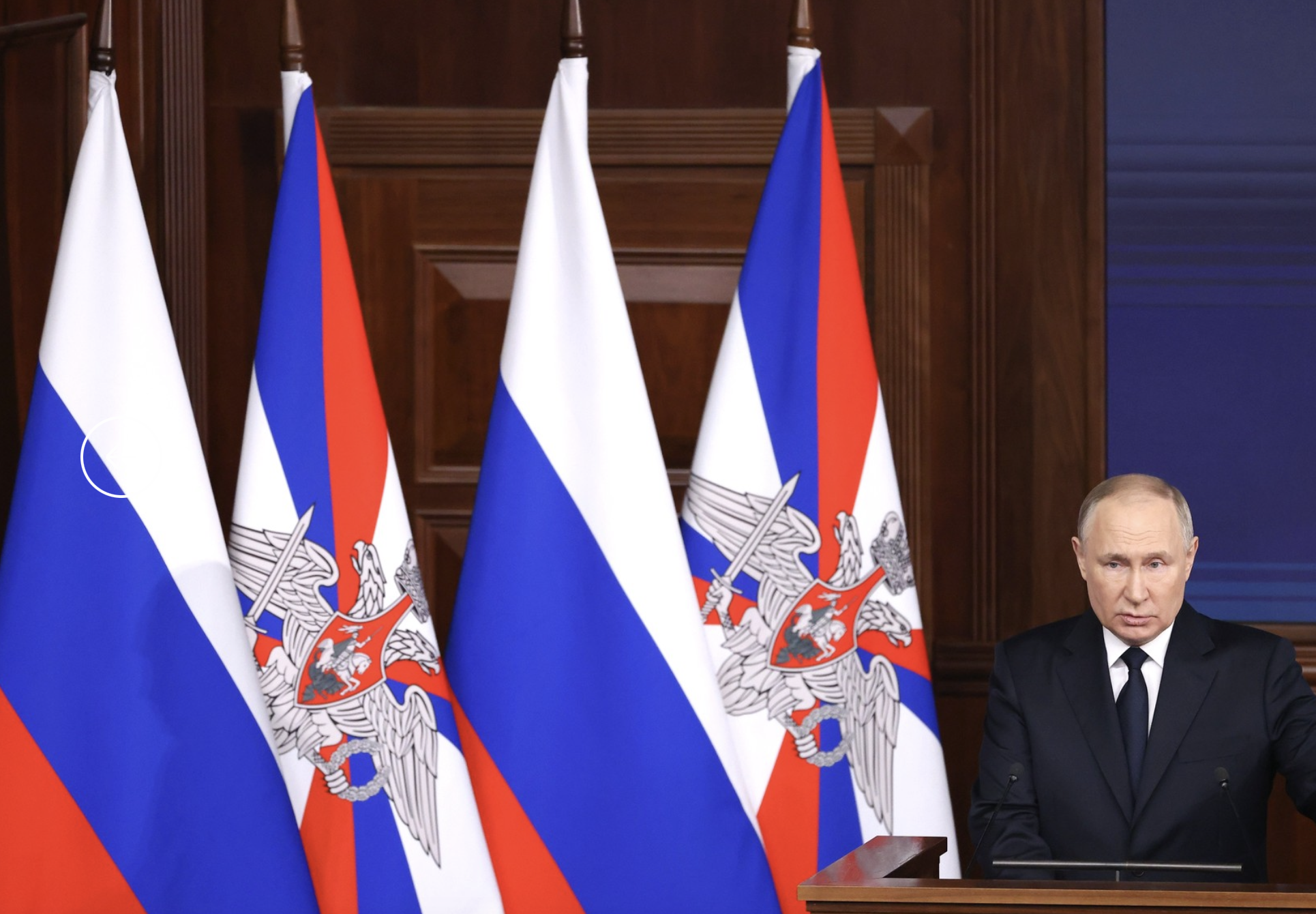
Russian President Vladimir Putin on Tuesday at a meeting of the Defence Ministry Board. (Artem Geodakyan, TASS)
By Scott Ritter
Special to Consortium News
Read Part One of this two-part series.
 Russians who lived through the 1990s remember the decade quite differently from Michael McFaul, the former U.S. ambassador/Stanford University professor. One such person is Marat Khairullin, a Russian journalist who has reported on Russia since the end of the Soviet Union.
Russians who lived through the 1990s remember the decade quite differently from Michael McFaul, the former U.S. ambassador/Stanford University professor. One such person is Marat Khairullin, a Russian journalist who has reported on Russia since the end of the Soviet Union.
In a remarkable essay published on his Substack account (I urge anyone interested in the reality of modern Russia and the war between Russia and Ukraine to subscribe), Khairullin lays out the connection between the war that McFaul and his fellow critics call Putin’s own, and the Russian people.
Entitled “Russia I am trying to forget,” Khairullin describes a time — the 1990s— where humanity was put on hold because of the corruption and depravations of the Yeltsin government, and reminds his readers that this is the Russia to which McFaul and the other erstwhile Western Russian “experts” want to return, something which Vladimir Putin has sworn to never allow to happen.
The goal of the collective West in promoting and sustaining the Russian-Ukraine conflict is to remove Putin from power and install a Yeltsin-like clone in his stead. Arat’s article serves as a stark warning about the consequences of such an outcome for the Russian people.
For Their Miserable Apartments
Khairullin recalls one assignment, in the early 1990s, where he traveled to “a small Ural town” to investigate an allegation of particular cruelty. “Lonely old people who remembered the Great Patriotic War (WWII) were evicted from their apartments throughout all the Russia,” Khairullin recalled.
“This happened everywhere — Moscow, Balashikha, St. Petersburg, Ufa, Kazan, Vladivostok…but in big cities, old people were spared, forced to assign these damned apartments to new owners and then evicted to live in some abandoned villages. In small towns, old people were simply mowed down.”
Khairullin’s investigation uncovered collusion between the town’s bureaucracy, the local police and the local mafia. “In a very short period of time (just a couple of years) that has passed since Yeltsin’s sovereignty was established in this classic Stalinist industrial town, 136 lonely pensioners had gone missing, and their apartments had changed ownership.”
The local police had a list of pensioners and their apartments. This list was turned over to the mafia, who simply took the pensioner out to the edge of town and murdered him or her. “The person disappears,” Khairullin noted, “after that they immediately clean the apartment up, and the next day they move in, the body of the person has not yet cooled down, but they are already in charge.”
Khairullin had to flee the Ural town in the trunk of a car to avoid being killed himself by the local mafia, who took umbrage at his investigation after being tipped off by the local police.
Khairullin condemns Yeltsin “for the death of these hundreds of thousands of old people abandoned to the mercy of fate,” and believes that the current Russian-Ukraine conflict is being fought in part “simply to make sure that our lonely old people would no longer be killed in the thousands for the sake of their miserable apartments.”
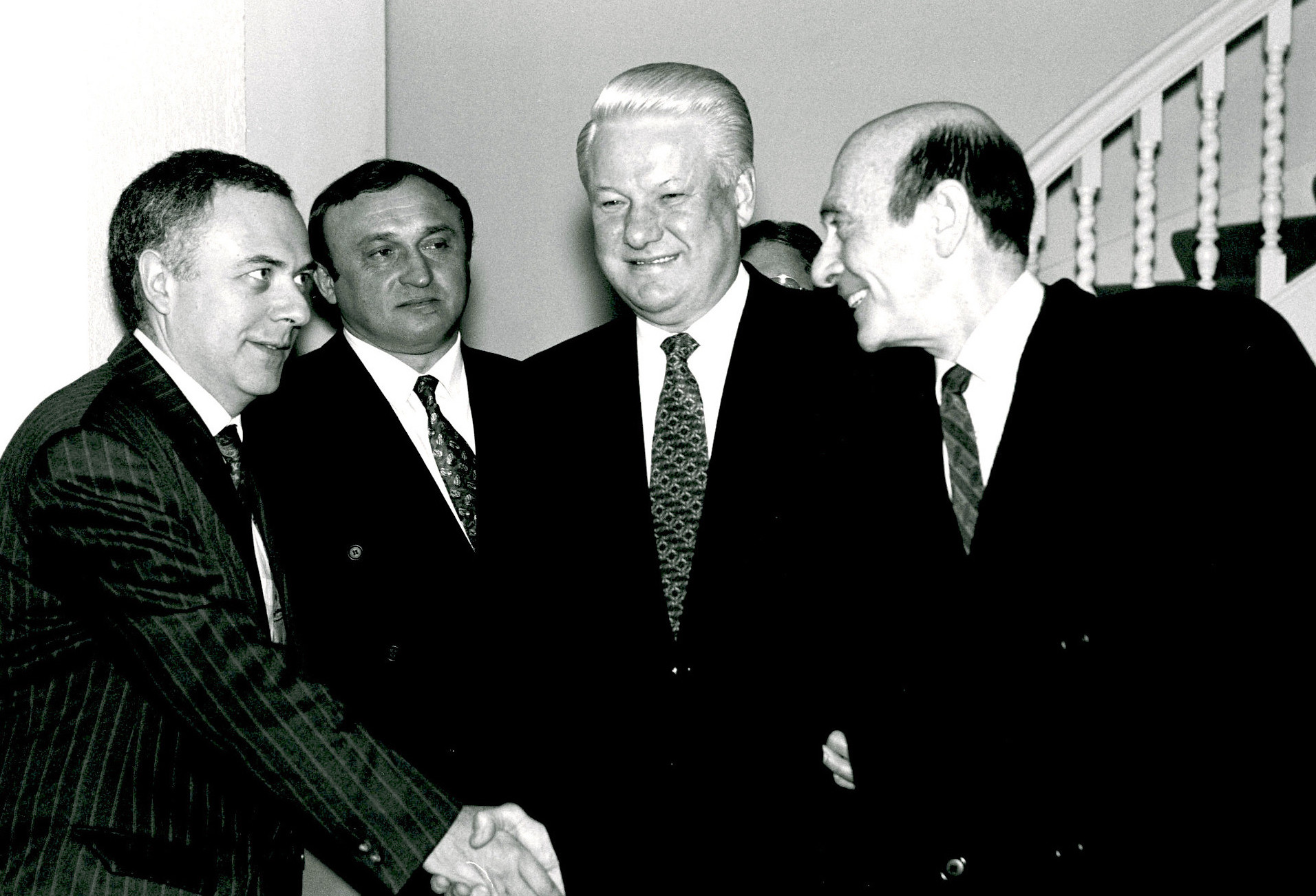
Dec. 9, 1993: Yeltsin, second from right, in Brussels to visit NATO Secretary General Manfred Wörner, on right. (NATO)
Khairullin tells of other experiences gained traveling “around the once great country where Democracy and Yeltsin had won.” One in particular hits hard. “I was a very callous person then,” Khairullin writes. “I almost never cried.”
And then he met Kuzmich, Aksa, and Sima.
Kuzmich was the local senior police officer of “some kind of God forgotten town, an eternal ‘polustanok’ [waypoint] on one of the endless outskirts of Russia.” He took Khairullin on a tour of the local train yard.
“And suddenly,” Khairullin writes, “Kuzmich rushed somewhere to the side, between the carriages, we caught up with him only when he was already dragging a kicking lump out of some hole. ‘Don’t you scratch, little devil, you know I won’t do anything…’ Kuzmich groaned, bringing out a grimy kid at most 8-10 years old into the light of the moon.”
This was Aksa.
Kuzmich took Aksa and Khairullin to the basement of the police building, where he sat the boy down at a table and fed him a sandwich.
“’Wait, that’s not all…’, Kuzmich said. “The door suddenly opened slightly and a girl of about six slipped through the crack and sat down next to Aska and took his hand. ‘Here, meet Sima,’ Kuzmich grinned: ‘I have about thirty of them running around the station here, but these ones are in love … Real love, they hold on to each other — she works in the carriages with shift workers, and this one guards her…Yes Seraphim? How much did you do today? Come on eat…’. Sima just bowed her head and began to smile at the floor quietly…Even then I noted what a nice, childlike smile she had.”
Khairullin and Kuzmich smoked cigarettes while Aksa and Sima ate and drank tea, before falling asleep in their chairs.
“That’s how it is here, correspondent,” Kuzmich said. “The nearest orphanage is half a thousand miles away … Yes, they escape from there…Where to place them…No one cares about them.” Khairullin writes:
“As far as I remember, starting from year 1997, the U.N. annually issued a special report on torture in the police (‘militia’ at the time) — this, of course, was an unfriendly move by the United States, nevertheless, it spoke about the state of the law enforcement system in the country. At the same time more than a thousand people annually died from the bullets of murderers on the streets of the capital city of my tortured country.
And in the very year when Putin became prime minister [1999], another terrible study was released which stated that every third girl in Russia under the age of 18 had the experience of ‘commercial sex.’ This is how Western researchers found a tolerant term to label prostitution in our country.
And there also used to be a slave market in Russia (about 15 thousand Russians were sold annually without their consent) and a special market for sexual slavery — according to various estimates, up to half a million of our girls were held ‘against their will’ in foreign brothels…”
Khairullin also says an unverified number of people, likely in the thousands, were victims of human organ traffickers every year during the 1990s.
Nineties Mortality Rates
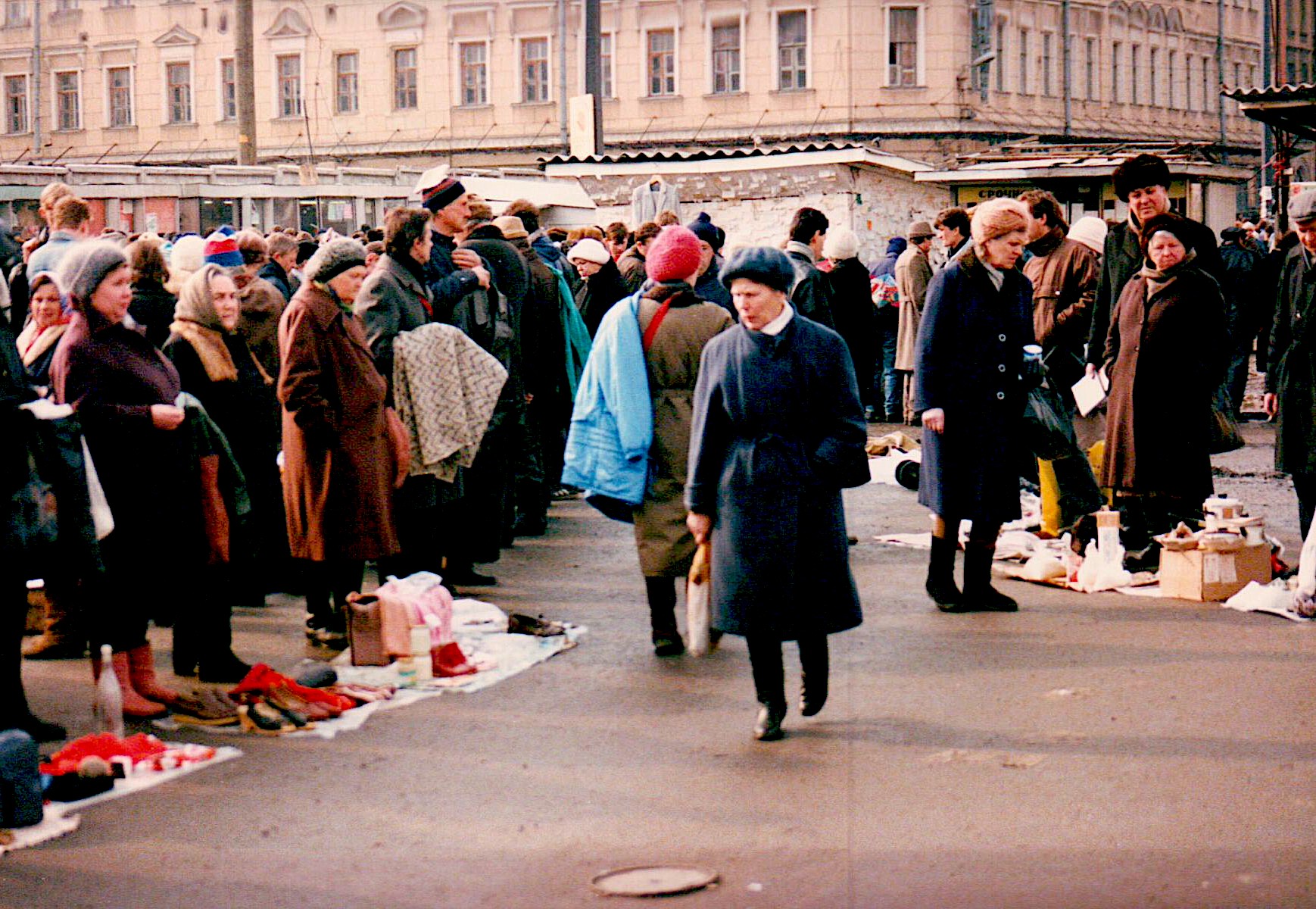
1992 flea market in Rostov-on-Don in southern Russia. (Brian Kelley, CC BY-SA 2.0, Wikimedia Commons)
According to Western researchers, “an extra 2.5-3 million Russian adults died in middle age in the period 1992-2001 than would have been expected based on 1991 mortality.”
This figure does not include infant mortality rates, the fate of missing children like Aksa and Sima, or the murdered pensioners. Altogether, it is believed at least 5 million Russians died as a direct result of the chaos that gripped Russia in the 1990’s — a chaos that Michael McFaul derides as “mythology.”
The 1990s is a reality that Khairullin and the people of Russia will never forget, regardless of how people like McFaul, Applebaum, Kendall-Taylor and Hill try to rewrite history.
Moreover, the linkage between the 1990s and the present in the minds of the Russian people is visceral — they support Russia’s conflict with Ukraine and the collective West not because they have been misled by Putin, but rather because they know their own history — much better than western pundits such as McFaul and company.
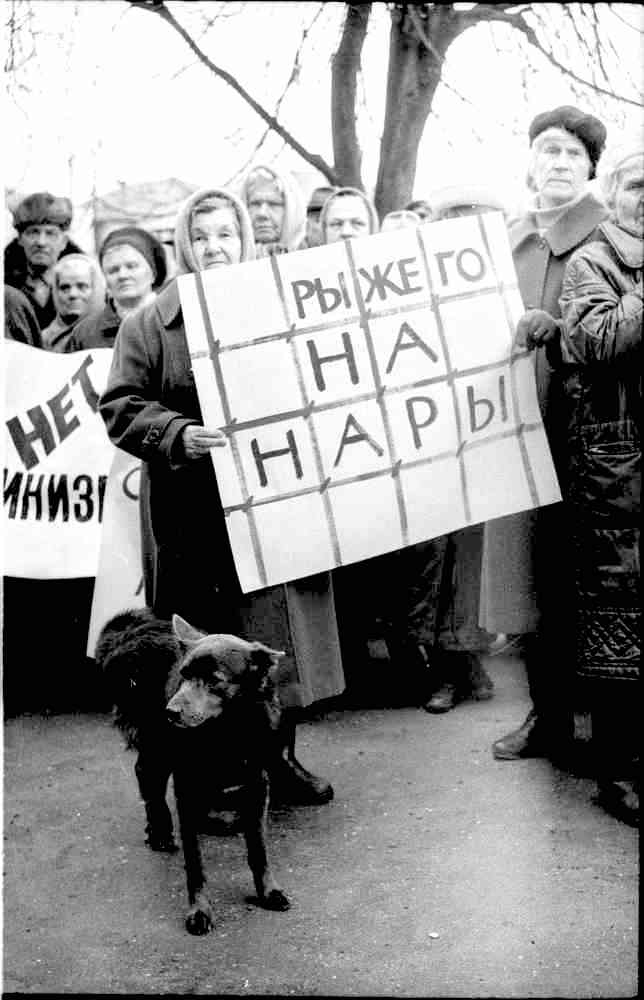
1998: Russians protest the economic depression caused by market reforms with banner saying: “Jail the redhead!” referring to Anatoly Chubais, the Russian economist who oversaw Yeltsin-era privatizations. (Pereslavl Week, Yu. N. Chastov, Wikimedia Commons, CC-BY-SA 3.0)
These pundits, whom I have classified as “Putin whisperers,” have had a hugely detrimental impact on fact-based discourse about Russia today.
“Rather than dealing with the reality of a Russian nation seeking its rightful place at the table of a multi-polar world,” I’ve previously noted, “the ‘Putin whisperers’ created a domestic market for their personification of all things Russian into the form of a single man” — Vladimir Putin.
“Russia stopped being a national security problem to be managed through effective diplomacy, but rather a domestic political issue which American politicians from both sides of the aisle used to scare the American people into supporting their respective visions of the world.”
What Putin Told David Frost
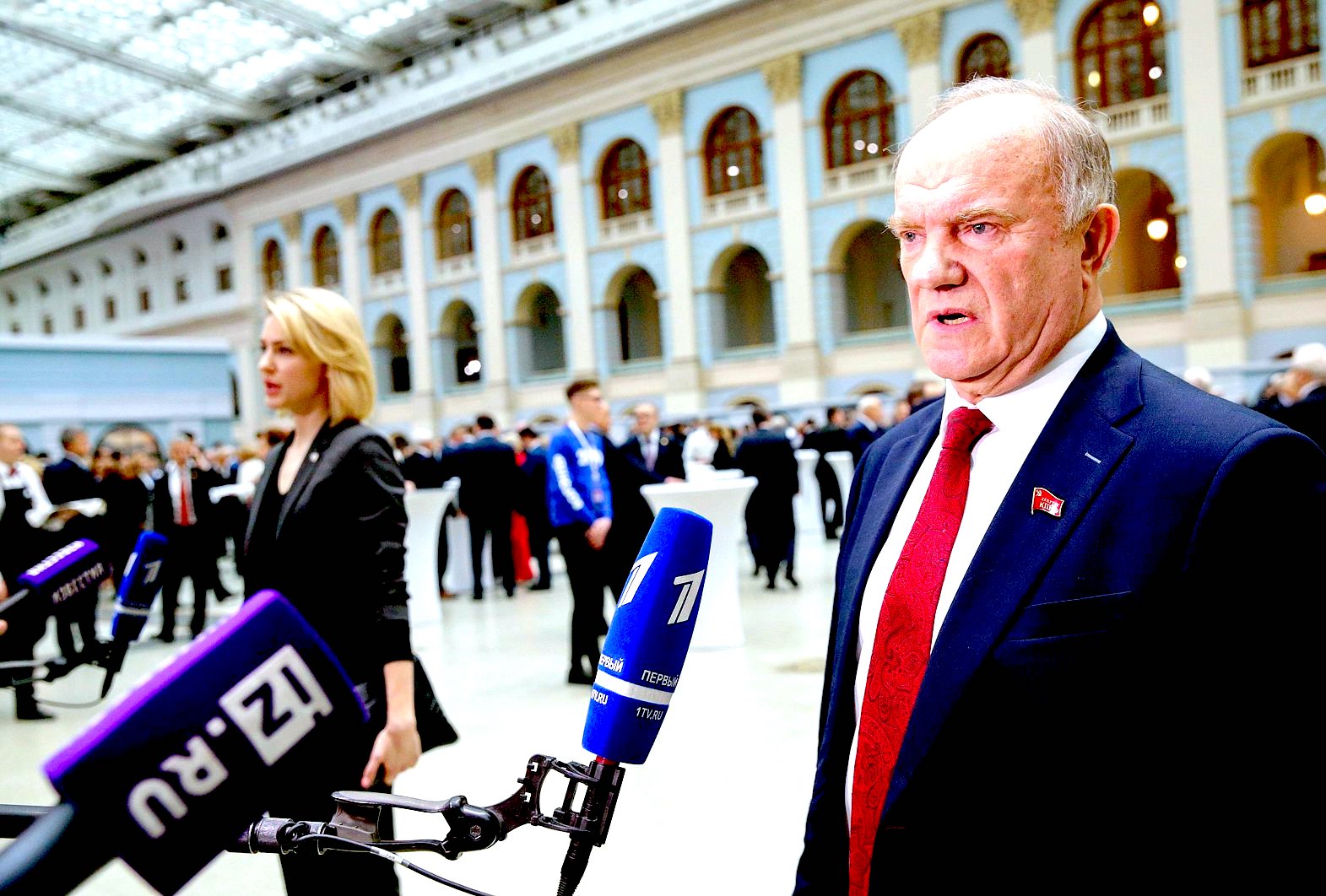
Gennady Zyuganov in February 2019, during Putin’s presidential address to the Federal Assembly. (Duma.gov.ru, Wikimedia Commons, CC BY 4.0)
On March 5, 2000, shortly before Putin was inaugurated following his victory over Gennady Zyuganov, leader of the Russian Communist Party, in the first presidential election following Boris Yeltsin’s resignation, the famous (and now departed) BBC journalist David Frost sat down for an interview with the Russian president-elect. The transcript of this interview is essential reading for anyone who seeks to “speak Putin.”
“My position,” Putin told Frost,
“is that our country should be a strong, powerful state, a capable and effective state, in which both its citizens and all those who want to cooperate with Russia could feel comfortable and protected, could always feel in their own shoes — if you allow the expression — psychologically and morally, and well off.
But this has nothing to do with aggression. If we again and again go back to the terminology of the Cold War we are never going to discard attitudes and problems that humanity had to grapple with a mere 15–20 years ago.
We in Russia have to a large extent rid ourselves of what is related to the Cold War. Regrettably, it appears that our partners in the West are all too often still in the grip of old notions and tend to picture Russia as a potential aggressor. That is a completely wrong conception of our country. It gets in the way of developing normal relations in Europe and in the world.”
Compare and contrast the tone and construct of Putin’s response to Frost with comments made recently in an interview with the Russian journalist Pavel Zarubin, who asked the Russian leader if he would “have been called a naive person in the 2000s?”
Putin answered:
“I had a naive idea that the whole world — and above all, the so-called ‘civilized’ one understands what happened to Russia [after the collapse of the Soviet Union], that it has become a completely different country, that there is no longer any ideological confrontation, which means there is no basis for confrontation.”
“If,” Putin continued,
“something negative happens in the policies of Western countries towards Russia — in particular, support for separatism and terrorism on Russian territory was obvious, I, as director of the FSB, saw this, but in my naivety, I believed that this was simply the inertia of thinking and action. This was a naive view of reality.”
In his discussion with Frost, when the BBC interviewer asked if he viewed NATO as an enemy, Putin answered:
“Russia is part of the European culture. And I cannot imagine my own country in isolation from Europe and what we often call the civilized world. So it is hard for me to visualize NATO as an enemy. I think even posing the question this way will not do any good to Russia or the world. The very question is capable of causing damage. Russia strives for equitable and candid relations with its partners.”
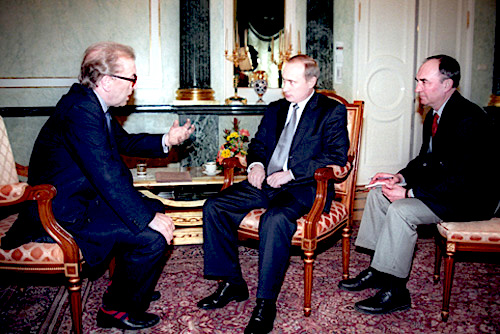
The BBC’s David Frost interviewing Russian President Vladimir Putin at the Kremlin on March 5, 2000. (Kremlin.ru, Wikimedia Commons, CC BY 4.0)
‘Now We’ll Ruin Russia Too’
In his answer to Zarubin, one can detect the disappointment in Putin’s words once the depth of betrayal by his erstwhile “partners” in the West had become clear.
“But the reality is,” Putin said, that “later I became absolutely one hundred percent convinced” that his Western “partners,” following the collapse of the Soviet Union, “thought that we [NATO] needed to be patient a little, ‘now we’ll ruin Russia too.’” Putin said:
“Such a large country by European standards, with the largest territory in the world and a fairly large population compared to other European countries, is generally not needed. It is better — as the famous U.S. politician Brzezinski proposed — to divide it into five parts, and these parts are separately subordinated to oneself and use resources, but based on the fact that everything separately will not have independent weight, independent voice, and will not have the opportunity to defend their national interests the way a united Russian state does. Only later did this realization come to me. And the initial approach was quite naive.”
Putin said Russia’s
“main concern is our own country, its place in the world today and tomorrow. When we are confronted with attempts to exclude us from the process of decision-making, this naturally causes concern and irritation on our part. But that does not mean we are going to shut ourselves off from the rest of the world. Isolationism is not an option. Victory is only possible when every citizen of this country feels that the values we promote yield positive changes in their day-to-day lives. That they’re beginning to live better, eat better, feel safer and so on.
But in this sense one can say we are still very far from our goal. I think we are still at the start of that road. But I have no doubt that the road we have chosen is the right one. And our goal is to follow this road, and to make sure our policies are absolutely open and clear for the majority of the Russian people.”
The fact that the layperson would be unable, in isolation, to readily identify Putin’s statement as part of his answer to Frost or Zarubin underscores the consistency of Putin’s position vis-à-vis Russia’s relations with the West over the course of the past 23-plus years.
It also upends the narrative that Putin has somehow transitioned from one type of leader when he first entered office, to another, more autocratic and isolated leader today. The above quote was from the Frost interview, but it could have been made today, or at any time during Putin’s more than two decades at the helm of the Russian Federation.
Words have meaning. Take, for instance, Putin’s use of the term “Special Military Operation.” It signifies something other than an invasion. Military operations do not rise to the level of full-scale war.
Putin has always sought negotiations with Ukraine — the proof of the pudding, they say, is in the eating: Up until the end of 2021, Putin promoted the Minsk Accords as the preferred mechanism for conflict resolution regarding Ukraine.
Once it became clear that neither Ukraine, France nor Germany (the three signatories to the Minsk Accords) was serious about their implementation, Russia next sought to negotiate directly with the United States and NATO, promulgating two draft treaties which were turned over to Russia’s Western partners for their evaluation and consideration in December 2021.
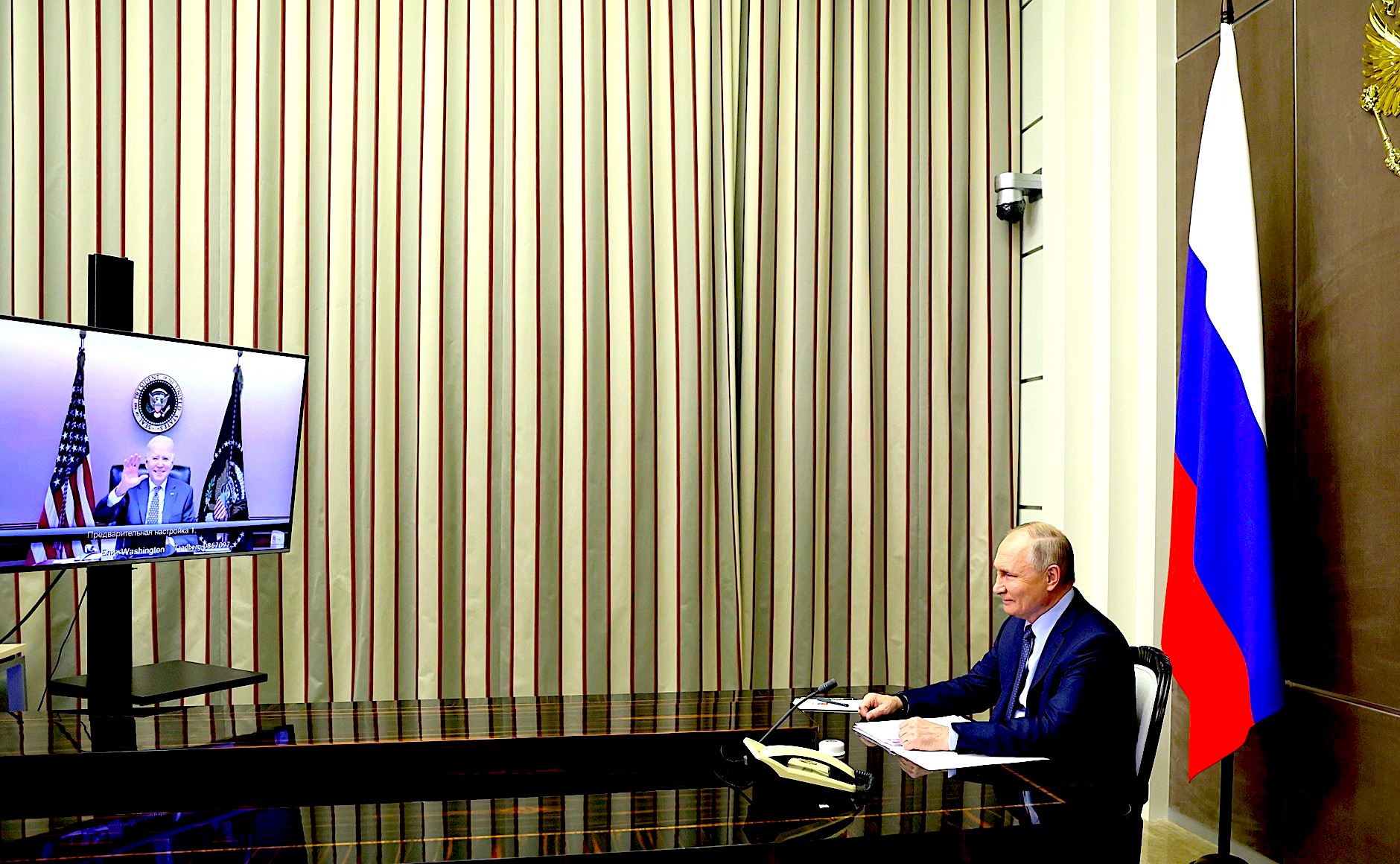
Dec. 7, 2021: U.S. President Joe Biden, on screen during video call with Putin. (Kremlin.ru, CC BY 4.0, Wikimedia Commons)
Both the U.S. and NATO gave short shrift to Russia’s proposals, leading to the decision to initiate the “Special Military Operation” on Feb. 24, 2023. Here is where the importance of words comes into play — rather than seeking the strategic defeat and destruction of Ukraine, which one would normally expect from a military operation of the scope and scale of the one undertaken on Feb. 24.
Whisperers’ Malign Influence
Russia — according to Davyd Arakhamiia, leader of the Servant of the People faction (Ukrainian President Volodymyr Zelensky’s party), who led the Ukrainian delegation during peace talks with the Russians in Belarus and Turkey in March 2022, was willing to exchange peace with Ukraine in exchange for Ukraine refusing to join NATO. Ultimately Ukraine, under pressure from then British Prime Minister Boris Johnson, rejected the Russian offer.
The collective West, not fully comprehending the limitations built into the term “Special Military Operation,”perceived weakness from Russia’s willingness to negotiate. The main reason for this lack of comprehension was the influence that the “Putin Whisperer’s” had on those who wrote the lexicon used to define and decipher Russia’s goals and objectives regarding NATO and Ukraine.
Had they “spoken Putin” (as any genuine expert could, and would), there is a good chance the collective West could have avoided the military embarrassment, economic consequences and geopolitical isolation that has taken place in the months since Ukraine walked away from the peace table.
Because of their grossly inaccurate assessments of Putin and Russia, Hill, Kendall-Taylor, Applebaum, McFaul, and a host of other “Putin Whisperer’s” have the blood of hundreds of thousands of Ukrainians on their collective hands.
Their crime was not just that they did not know how to “speak Putin,” but rather that they deliberately refused to try, instead choosing a path of deliberate obfuscation and deceit when it came to defining Russia and its leader for the western audience.
When advising on issues of national security involving Russia, the failure to “speak Putin” on the part of anyone charged with influencing and/or making Russia policy, borders on the point of criminal negligence.
And if your job is to provide assessments on Russia of a more commercial nature, the failure to “speak Putin” means not only that you’re not very good at your job, but also that perhaps it is time to begin considering finding another career.
Scott Ritter is a former U.S. Marine Corps intelligence officer who served in the former Soviet Union implementing arms control treaties, in the Persian Gulf during Operation Desert Storm and in Iraq overseeing the disarmament of WMD. His most recent book is Disarmament in the Time of Perestroika, published by Clarity Press.
The views expressed are solely those of the author and may or may not reflect those of Consortium News.
oooooo
Right_wing_Bangladeshi_@_Md_zidan
@RealScottRitter sir please raise this topic
Aipamena
Sulaiman Ahmed @ShaykhSulaiman
@ShaykhSulaiman
abe. 19
BREAKING:
NEW FOOTAGE FROM OCT 7 SHOWS AN ISRAELI TANK FIRING AT ISRAELI HOMES IN KIBBUTZ BE’ERI
Bideoa: https://twitter.com/i/status/1737091951340490905
oooooo
youtube.com
Scott Ritter and Friends talks about the connection between Oil…
Scott Ritter and Friends talks about the connection between Oil Pipelines, Gaza and Ukraine #scottritter #oil #gaza
Bideoa: https://youtu.be/Flme2zvpWxE
oooooo
Scott Ritter Challenges RFK’s Palestine Policy
oooooo
youtube.com
SCOTT RITTER, WILL HAMAS EVER SURRENDER? /LIVESTREAM
#scottritter #ukraine #russia #palestine #isreal #military #politicalnews Join ma and become a
Bideoa: https://youtu.be/c-s3600cMRw
oooooo
Gaza has the highest percentage of people with PhDs per square mile. These are people with dreams. Imagine what they could be if zionism didn’t exist.
oooooo
Ni neu exilioan bizi naiz, aspalditik
“Exile is more than a geographical concept. You can be an exile in your homeland, in your own house, in a room.”

